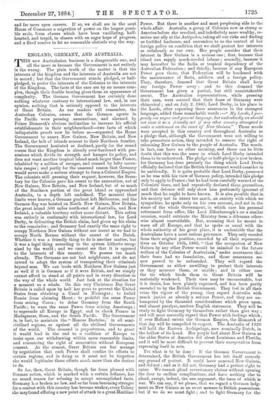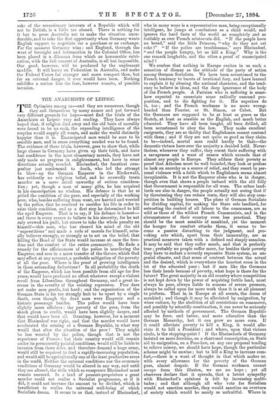ENGLAND, GERMANY, AND AUSTRALIA.
THIS new Australasian business is a disagreeable one, and all the more so because the Government is not entirely in the wrong. The plain truth of the matter is that the interests of the kingdom and the interests of Australia are not in accord ; but that the Government stands pledged, or half- pledged, to prefer the interests of the Colonies to the interests of the Kingdom. The facts of the case are by no means com- plex, though their double bearing gives them an appearance of complexity. The German Government has certainly done nothing whatever contrary to international law, and, in our opinion, nothing that is seriously opposed to the interests of Great Britain. As our readers will remember, the Australian Colonies, aware that the German agents in the Pacific were pressing annexations, and alarmed by Prince Bismarck's obvious inclination to increase his official establishments in their neighbourhood—two facts of which indisputable proofs now lie before us—requested the Home Government to annex New Guinea, New Britain, and New Ireland, the belt of islands nearest to their Northern frontier. The Government hesitated or declined, partly for the sound reason that the Kingdom is already over-burdened with pos- sessions which divide its strength and hamper its policy, and does not want another tropical island much larger than France, inhabited by a million of savages, and crossed by lofty moun- tain ranges ; and partly for the unsound reason that Germany would never make a serious attempt to form a Colonial Empire. The colonists still pressing their request, however, the Secre- tary for the Colonies gave his assent to the annexation, not of New Guinea, New Britain, and New Ireland, but of so much of the Southern portion of the great island as approached Australia, to a depth left undefined. The moment these limits were known, a German gunboat left Melbourne, and the German flag was hoisted on North New Guinea, New Britain, the great island 500 miles north-east of Australia, and New Ireland, a valuable territory rather more distant. This action was entirely in conformity with international law, for Lord Derby, in delimiting the British claim, had given up his claim to the remainder; and Germany had exactly the same right to occupy Northern New Guinea without our assent as we had to occupy North Borneo without the assent of the Dutch. Whether it was a friendly thing to do is another matter, but it was a legal thing according to the system hitherto recog- nised by the world ; and we cannot see that it is opposed to the interests of this country. We possess too much already. The Germans are not bad neighbours, and do not intend to adopt the system of transporting their criminals beyond seas. We can trade with Northern New Guinea just as well if it is German as if it were British, and we simply cannot afford to stand at all points and in every direction in the way of the whole world. Just look at the situation for a moment as a whole. On this very Christmas Day Great Britain is called upon by half her press to prevent the United States from obtaining a Canal in Nicaragua ; to forbid Russia from claiming Herat ; to prohibit the same Power from seizing Corea ; to debar Germany from the South Pacific ; to warn the same Power from seizing A matonga ; to supersede all Europe in Egypt, and to check France in Madagascar, Siam, and the South Pacific. The Government is, in fact, to maintain the a Monroe Doctrine," in all semi-
civilised regions, as against all the civilised Governments of the world. The demand is preposterous, and to grant it would lead in the end to a coalition of Europe to insist upon our withdrawing within more reasonable limits, and renouncing the right of annexation without European consent. At the utmost, Great Britain can but arrange by negotiation that each Power shall confine its efforts to certain regions, and in doing so it must not be forgotten she would legitimise those efforts much more than she desires to do.
So far, then, Great Britain, though far from pleased with German action, which is marked with a certain defiance, has no sound reason for refusing to accept accomplished facts. Germany has broken no law, and so far from becoming stronger for a contest with this country has become weaker, every Colony she mayfound offering a new point of attack to a great Maritime
Power. But there is another and most perplexing side to the. whole affair. Australia, a group of Colonies now as strong as America before she revolted, and indefinitely more wealthy, re- mains our ally at the Antipodes, taking all our risks and finding us fortified harbours, and surrenders to us the control of her foreign policy on condition that we shall protect her interests as sedulously as our own. Her people consider that their interest in New Guinea is a serious one ; first, because that island can supply much-needed labour ; secondly, because it may hereafter be the India or tropical dependency of the Australian Federation ; and thirdly, because if any European Power goes there, that Federation will be burdened with the maintenance of fleets, soldiers, and a foreign policy, They, therefore, demand that Great Britain shall keep any foreign Power away ; and to this demand the Government has given a partial, but still unmistakeable assent. The Australian representatives, while pressing their case, were assured that their fears of Germany were chimerical ; and on July 2, 1883, Lord Derby, in his place in the Lords, after repeating these assurances in the strongest language, added these remarkable words :—‘• My Lords, I pur- posely use vague and general language, but undoubtedly we should not view it as a friendly act if any other country attempted to make a settlement on the coast of New Guinea." These words were accepted in this country and throughout Australia as a pledge that, although the Government were not willing to take premature action, they intended to reserve the right of colonising New Guinea to the people of Australia. The words, in fact, can have no other meaning, and there can be little doubt that this was the sense in which Lord Derby intended them to be understood. The pledge or half-pledge is now broken, for Germany has done precisely the thing which Lord Derby officially declared that the British Government would consider to be unfriendly. It is quite probable that Lord Derby, possessed as he was with his view of German policy, intended this pledge only to apply to France ; but he had been carefully warned of the Colonists' fears, and had repeatedly declared them groundless, and that defence will only show him profoundly ignorant of much that he ought to have known. It is also possible that in his anxiety not to annex too much, an anxiety with which we- sympathise, he spoke only on his own account, and not in the name of the whole Government, in which case his personal_ retirement from office, like Loid Ellenborough's on a similar occasion, would extricate the Ministry from a dilemma other- wise almost unavoidable. But, assuming that he meant to . warn off all Europe, and that he spoke as usual with the whole authority of his great place, it is undeniable that the Australians have a most serious grievance. They only receded from their original position, recorded by all their representa- tives on October 18th, 1883, " that the occupation of New Guinea by any other Power would be inimical to the future welfare of the Colonies of Australasia," under assurances that their fears had no foundation, and those assurances are now proved to be unfounded. They will regard the Government as either unwilling to protect their interest& as they measure them, or unable ; and in either case the tie which binds them to Great Britain will be materially weakened. Their view may be unreasonable, but it is theirs, has been plainly expressed, and has been partly assented to by the British Government. They feel in all their veins the vigour of the young, they regard Australia with much justice as already a serious Power, and they are un- hampered by the thousand considerations which press upon,. and almost paralyse, modern English statesmen. They will be ready to fight Germany by themselves rather than give way ; and will most assuredly regard that Power with feelings which,
if ever Holland enters the German Empire, the Bismarck of that day will be compelled to respect. The Australia of 1920
will hold the Eastern Archipelago, now nominally Dutch, in the hollow of its hand. Her people feel about New Guinea as the older States of America did about Louisiana and Florida, and it will be most difficult to prevent their exasperation from. expressing itself in acts.
Yet what is to be done ? If the German Government is. determined, the British Government has left itself scarcely- any ground of protest. It could have annexed New Guinea,. and did not ; and as it did not, Germany had a perfect right to enter. We cannot plead reversionary claims without opening the door to endless complications, and have nothing else to plead, except, indeed, the one argument, the issue of which is war. We can say, if we please, that we regard a German lodg- ment on New Guinea as an overt menace to British possessions, but if we do we must fight ; and to fight Germany for the sake of the reversionary interests of a Republic which will not be British, is a little too absurd. There is nothing for it but to press Australia not to make the situation unen- durable, and to take the first opportunity when Germany wants English support to negotiate for a purchase or an exchange. For the moment Germany wins ; and England, through the want of foresight and information in the Colonial Office, has been placed in a dilemma from which an honourable extri- cation, with the full consent of Australia, is all but impossible. One good, however, will be produced by the unpleasant muddle. It will hurry on Federation in Australia, and make the Federal Union far stronger and more compact than, but for an external danger. it ever would have been. Nothing solidifies a nation like the fear, however remote, of possible invasion.



































 Previous page
Previous page